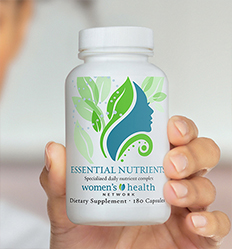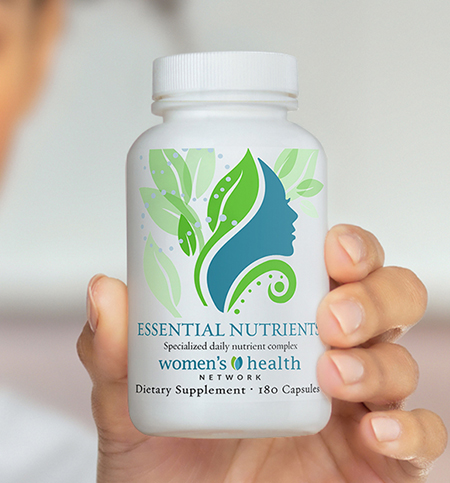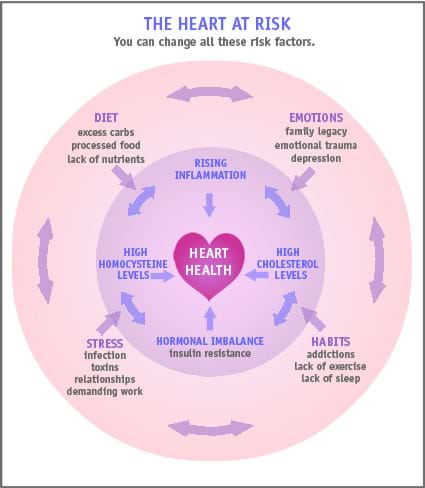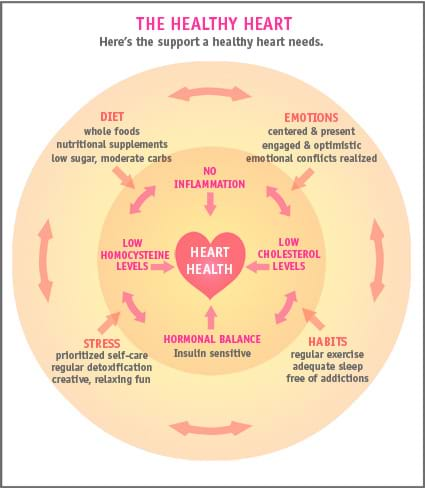Reviewed by Dr. Sarika Arora, MD
During a woman’s childbearing years, estrogen levels provide a wide range of protective benefits for heart health. Among its many positive effects, estrogen helps to reduce inflammation, maintain balanced cholesterol levels and improve vasodilation, keeping blood vessels relaxed and blood pressure within normal limits.

As women enter the menopause transition, estrogen levels fluctuate and eventually decline. Without enough estrogen to maintain its protective effects, women can face greater risk for developing cardiovascular health issues, including high cholesterol and high blood pressure.
Women’s heart health is not just about estrogen, of course. Chronic stress and other lifestyle factors – poor diet, smoking and lack of exercise among them – all contribute to a woman’s risk for poor heart health over her lifetime. However, as estrogen’s “masking effect” to buffer these habits begins to diminish in perimenopause and menopause, lifestyle factors can start to take a particularly heavy health toll.
And what all this means for women anywhere in the menopause transition is this: Pay attention to your heart health! The good news is that there is SO much you can do to protect your cardiovascular health no matter what your age.
Alongside a balanced diet and an active lifestyle, research shows that incorporating certain vitamins and supplements helps give women’s heart health a much needed boost.
Best vitamins and supplements for heart health
Concerned about your heart health? Here is a list of vitamins, minerals and other natural compounds that help support and strengthen your ability to keep your heart happy!
Omega-3 Fatty Acids
Essential Omega-3 fatty acids, commonly found in fish oil, are renowned for their heart-protective benefits. They help reduce inflammation, lower triglyceride levels and support healthy cholesterol levels. Incorporating Omega-3s into your diet can be as simple as consuming fatty fish such as salmon, mackerel or sardines twice a week. Alternatively, high-quality fish oil supplements can provide a convenient and concentrated source of Omega-3s.
What the research says: According to a 2022 meta-analysis published in the journal Frontiers of Nutrition, supplementation with Omega-3 fatty acids significantly reduced the risk of major cardiovascular events, including heart attacks and strokes even in individuals with a history of heart disease or high cardiovascular risk.

Folic Acid
Folic acid, a type of B vitamin, aids in reducing levels of homocysteine, an amino acid linked to an increased risk of heart disease. By maintaining optimal levels of folic acid, women can promote heart health and reduce the risk of cardiovascular problems. Foods rich in folic acid include leafy green vegetables, legumes, fortified grains and citrus fruits. To supplement, look for folic acid as part of a high quality women’s multivitamin.
What the research says: A 2022 meta-analysis study published in the Journal of the American Heart Association found that supplementation with folic acid reduced stroke risk and overall risk for cardiovascular disease.
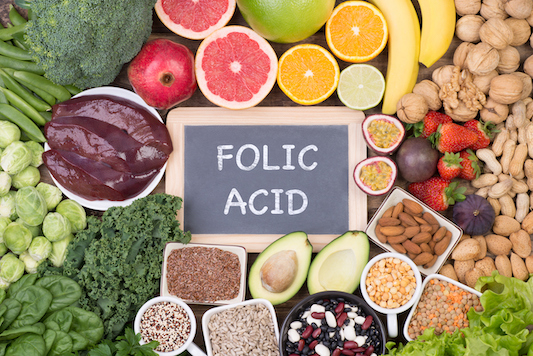
CoQ10
Coenzyme Q10 (CoQ10) is a naturally occurring antioxidant found in every cell of the body. It plays a crucial role in supporting cardiovascular health by reducing oxidative stress and supporting energy metabolism within the heart muscle. As women age, their natural production of CoQ10 diminishes, making supplementation particularly important. To ensure maximum absorption of the antioxidant, look for CoQ10 supplements with enhanced bioavailability.
What the research says: A 2018 study published in the Journal of Clinical Lipidology concluded that CoQ10 supplementation reduced markers of inflammation and improved overall cardiovascular health in individuals with high cholesterol.
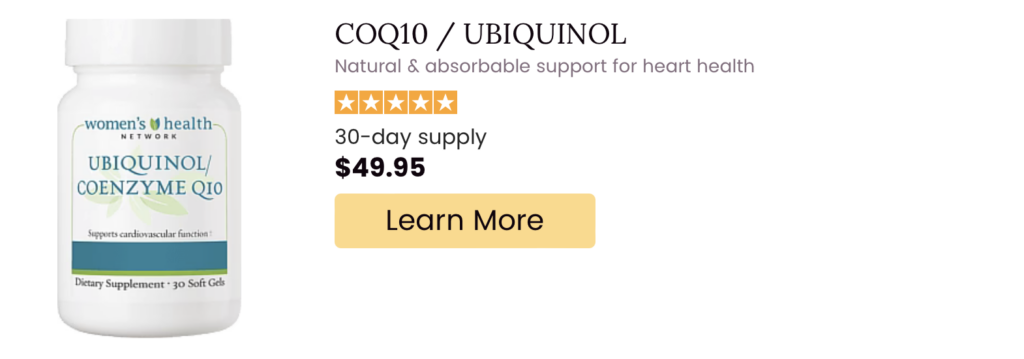
Vitamin D
Vitamin D is a fat-soluble vitamin that is synthesized in the skin when exposed to sunlight. It plays a crucial role in maintaining bone health by regulating calcium levels. But it also has significant implications for heart health. Research suggests that Vitamin D deficiency may be associated with an increased risk of cardiovascular diseases, including heart disease, hypertension and heart failure.
What the research says: According to a 2012 American Journal of Cardiology study, Vitamin D deficiency was associated with a significant risk for cardiovascular disease. Taking a Vitamin D supplement led to improved outcomes in cardiovascular patients with prior deficiencies in the vitamin.
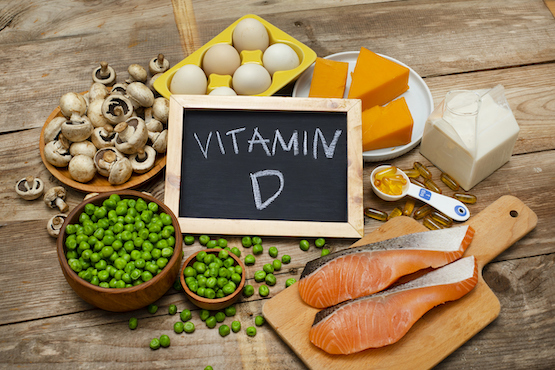
Green Tea
Green tea has long been celebrated for its numerous health benefits, including its positive impact on heart health. Packed with antioxidants called catechins, green tea helps reduce inflammation, improve blood vessel function and lower cholesterol levels. Regular consumption of green tea or taking an antioxidant supplement with green tea extract can be a valuable addition to a heart-healthy lifestyle.
Study: A 2019 study published in Nutrition Research and Practice demonstrated that green tea consumption was associated with a reduced risk of coronary artery disease and stroke, specifically in women. The study also highlighted green tea’s potential to improve lipid profiles and blood pressure.

Vitamin K2
Vitamin K2 plays a critical role in regulating calcium metabolism in the body. It works synergistically with Vitamin D to ensure calcium is directed to the appropriate areas, such as bones and teeth, while preventing its deposition in arteries and soft tissues.
Vitamin K2 also has anti-inflammatory properties that can contribute to overall heart health by reducing inflammation in blood vessels. It can be found in foods including some hard cheeses (especially aged gouda) and natto (fermented soybeans).
What the research says: According to a 2021 study review of Vitamin K published in the British Medical Journal, increased intake of Vitamin K2 may help reduce arterial stiffness, slow progression of vascular and valvular calcification, and lower the incidence of diabetes and coronary artery disease.
Fiber Sterols and Stanols
Fiber sterols and stanols are plant compounds that have been shown to lower LDL “bad” cholesterol levels. They are also sometimes called plant sterols. Incorporating sources of sterols and stanols into your diet, found in sterol-fortified spreads, yogurts and nutritional supplements, can contribute to maintaining healthy cholesterol levels as you age.
Study: A 2020 Journal of the American Heart Association report on the Blood Flow Randomized Intervention Study found that regular consumption of plant sterol or stanol-enriched foods significantly reduced LDL cholesterol levels, highlighting their potential role in reducing cardiovascular risk.
Garlic
Garlic has been used for centuries for its medicinal properties, including its potential cardiovascular benefits. It contains compounds that can help lower blood pressure, reduce cholesterol levels and improve overall heart health. Incorporating fresh garlic into your diet is ideal. But garlic supplements can be a convenient alternative for those who may not enjoy its taste or odor.
What the research says: A meta-analysis published in the Journal of Experimental and Therapeutic Medicine (2020) concluded that garlic supplementation was associated with a significant reduction in systolic and diastolic blood pressure in individuals with hypertension, contributing to better heart health. Garlic supplementation was also found to improve arterial stiffness and gut microbiota.
Magnesium
Magnesium plays a vital role in maintaining heart rhythm, muscle function and blood pressure. It supports cardiovascular health by relaxing blood vessels, regulating blood sugar levels and reducing inflammation. Consuming magnesium-rich foods like leafy greens, nuts, seeds and whole grains is beneficial. But supplements can also ensure adequate intake, especially for women with specific dietary restrictions.
What the research says: A 2016 BMC Medical Journal study found that higher dietary magnesium intake was associated with a reduced risk of stroke, heart failure and type 2 diabetes.

L-Carnitine
L-Carnitine is an amino acid compound involved in energy metabolism. It helps transport fatty acids into cells’ mitochondria, where they are converted into energy. Supplementing with L-Carnitine can aid in the metabolism of Omega-3 fatty acids, potentially reducing the risk of heart disease. Consult with a healthcare professional before starting L-Carnitine supplementation.
Study: A 2014 meta-analysis published in the journal BMC Cardiovascular Disorders found that L-Carnitine supplementation significantly reduced major adverse cardiovascular events, including heart attacks and angina, in individuals with acute myocardial infarction (heart attack).
If you have heart health concerns, talk to your doctor about supplements and other proactive steps towards promoting a strong and resilient heart. This is especially important if you are already taking medication for high blood pressure, high cholesterol or a related condition.
Our tips and recommendations for improving heart health
To reduce your risk of heart disease, here are some lifestyle changes that can help.
Eat well, eat right
Build a diet low in sodium, high in fruits, vegetables, lean proteins and “good fats.” This can significantly reduce your cholesterol levels — without the potential side effects of drugs. Choose a top-quality vitamin–mineral supplement and take it every day. Steady and consistent nutritional supplementation bridges nutritional gaps that could lead to inflammation and elevated homocysteine levels. It also gives your cardiovascular system important raw materials.
Exercise today, tomorrow and the next day
Your heart is a muscle and the best way to build muscle strength is to exercise. Current guidelines recommend at least 30 minutes of moderate daily activity, 5 days per week. Start slowly if you need to, say 5–10 minutes a day, and work up to more. Mindfulness exercise practices such as yoga and t’ai chi are wonderful. They simultaneously reduce stress and are good for heart health.

Reduce stress and emotional conflict
Take an inventory of the sources of stress in your life, and then list what you can do about them. Pay particular attention to stress that is linked to negative patterns in your life. There are lots of small things you can do to reduce stress. If you need help and can afford it, invest in therapy. With the right therapist therapy can help you resolve the root of your worst stress.
At the same time, increase your joy every chance you get. When you open your heart and maximize every opportunity for joy, you bring balance and love into your emotional life. Look into massage, restorative yoga, bodywork and other alternative treatments. (Read our listing of alternative and complementary therapies.) Find something you love, and then do it. Your heart is counting on you, so start being your own best friend.
If your heart needs attention, see your practitioner. If blood tests reveal high levels of LDL, or you have a strong family history or other issues such as diabetes you may want to consider medication.







